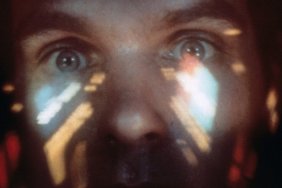An elderly man – thin, bald, gray – leans over the hospital bed of his wife (also elderly, also frail; comatose) and says loudly “Talk to me! Talk to me!” Half a beat passes and his voice drops a bit as he implores, “Please,” before lifting her limp hand to his mouth and then kissing her lips. It’s a bracing moment, one that injects gravitas into the documentary EMIC: A Time Capsule From the People of Earth, directed by David Brodie and curated by Christopher Nolan (yes, that Christopher Nolan) from over ten thousand video and photo submissions from all over the world. Available exclusively on Google Play, the short was inspired by Nolan’s Interstellar, and is meant to be a time capsule to illustrate life on earth for future humans, those presumably living on another planet with no direct contact with or personal memories of Earth.

Incredibly fast moving – no action or still photo is onscreen for more than a few seconds – and dense with ideas and life-affirming philosophizing, the short film at times looks and feels like an abridged, inverted version of the classic 1982 experimental documentary Koyaanisqatsi (only with an English language voice-over). The goal of that film was to show how disconnected humans have become from nature, to warn of the costs of that estrangement. But with its numerous cuts to waterfalls, snow covered mountains, oceans, and sprawling green landscapes, EMIC’s respect for Earth is front and center. Yet those elements share the stage with the film’s true object of reverence: humanity in all its manifestations. Every hue and accent is represented; as noted, English is the only language spoken on the audio track, but it’s filtered through a host of other tongues. Every major religion is repped. Women are onscreen in a range of capacities, given as much screen time as men. And there are enough cute babies to make the bitterest curmudgeon break out a smile.

What keeps the whole experiment (whose thesis is the question, “What would you want to remember if you left earth?”) from inducing a sugar coma are moments like the one of the senior couple, where flashes of human grief and despair balance the picture of what it means to be human. That’s where the presence of Nolan (whose films collectively posit a worldview that is alternately/simultaneously melancholic and grim) is most keenly felt, even as the overall film tilts heavily toward a “love is all you need / we are the world” stance. Brodie manages to pull a uniform style from EMIC’s cuisinart aesthetic—some images are as crisp and meticulously composed as a fashion magazine layout; others are blurry, murky, often gorgeously rudimentary image-making from the hands of non-pros. Sprinkled with quotes from TS Eliot and C.S. Lewis, the film seeks to quell what one speaker observes when he notes, “We are secretly afraid that our existence is for nothing.” The evidence presented assures us that the fear is unfounded.

Ernest Hardy is a Sundance Fellow whose music and film criticism have appeared in the New York Times, the Village Voice, Vibe, Rolling Stone, LA Times, and LA Weekly. His collection of criticism, Blood Beats Vol. 1: Demos, Remixes and Extended Versions (2006) was a recipient of the 2007 PEN / Beyond Margins Award.






